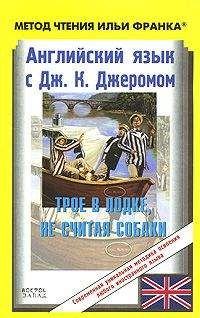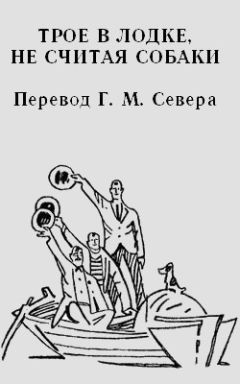Jerome Jerome - Английский язык с Джеромом К. Джеромом. Трое в лодке, не считая собаки
Meanwhile, the rain came down in a steady torrent (между тем, дождь лил /постоянным/ потоком), and the lower part of the town was under water (и нижняя часть города была под водой = затоплена), owing to the river having overflowed (из-за того, что река вышла из берегов; owing to — из-за, вследствие, по причине).
Boots said it was evident that we were going to have a prolonged spell of grand weather some time (коридорный сказал, очевидно, что у нас будет длительный период великолепной погоды когда-нибудь; spell — промежуток времени, срок, период), and read out a poem which was printed over the top of the oracle, about (и прочитал стихотворение, которое было написано над предсказателем /погоды/; to print — напечатать, запечатлеть, написать печатными буквами; oracle — оракул, предсказатель):
instrument [ˈɪnstrumǝnt] drought [draut] famine [ˈfæmɪn] oracle [ˈɔrǝkl]
I tapped it again the next morning, and it went up still higher, and the rain came down faster than ever. On Wednesday I went and hit it again, and the pointer went round towards "set fair," "very dry," and "much heat," until it was stopped by the peg, and couldn't go any further. It tried its best, but the instrument was built so that it couldn't prophesy fine weather any harder than it did without breaking itself. It evidently wanted to go on, and prognosticate drought, and water famine, and sunstroke, and simooms, and such things, but the peg prevented it, and it had to be content with pointing to the mere commonplace "very dry."
Meanwhile, the rain came down in a steady torrent, and the lower part of the town was under water, owing to the river having overflowed.
Boots said it was evident that we were going to have a prolonged spell of grand weather some time, and read out a poem which was printed over the top of the oracle, about:
"Long foretold, long last (предсказание: «предсказанный» задолго — долго длится; to foretell — предсказывать, прогнозировать);
Short notice, soon past (предупреждение за короткий срок вскоре проходит; past — прошедший, истекший)."
The fine weather never came that summer (хорошая погода так и не наступила в то лето). I expect that machine must have been referring to the following spring (полагаю, что тот прибор, должно быть, ссылался на = имел в виду следующую весну; to expect — ожидать; думать, полагать; machine — машина, устройство, механизм).
Then there are those new style of barometers, the long straight ones (существует новый тип барометров, /такие/ длинные, прямые). I never can make head or tail of those (никогда не могу в них разобраться; to make head or tail of — понимать что-либо, разбираться в чем-либо: «сделать голову или хвост = разобрать, где голова, а где хвост»). There is one side for 10 a.m. yesterday (одна сторона /служит/ для десяти утра вчерашнего дня), and one side for 10 a.m. to-day (и одна — для десяти утра сегодняшнего); but you can't always get there as early as ten, you know (но, знаете, не всегда можно подойти к нему так рано /как десять/). It rises or falls for rain and fine, with much or less wind (он поднимается и падает при дожде и ясной /погоде/, с сильным или слабым ветром), and one end is "Nly" and the other "Ely" (what's Ely got to do with it?) (на одном конце /написано/ «Сев.», а на другом «Вос.», — и при чем здесь Или; nly = northerly — северный /о ветре/; ely = easterly — восточный /о направлении, ветре/; Ely — Или /город в графстве Кембриджшир/), and if you tap it, it doesn't tell you anything (а если постучать по нему, он ничего вам не покажет). And you've got to correct it to sea-level, and reduce it to Fahrenheit (и приходится делать поправку на уровень моря и переводить /градусы/ по шкале Фаренгейта; to correct — исправлять, вносить поправки; to reduce — сокращать; переводить в другие единицы), and even then I don't know the answer (и даже тогда я не знаю ответа = ничего на понятно).
machine [mǝˈʃi:n] Fahrenheit [ˈfærǝnhaɪt] answer [ˈɑ:nsǝ]
"Long foretold, long last;
Short notice, soon past."
The fine weather never came that summer. I expect that machine must have been referring to the following spring.
Then there are those new style of barometers, the long straight ones. I never can make head or tail of those. There is one side for 10 a.m. yesterday, and one side for 10 a.m. to-day; but you can't always get there as early as ten, you know. It rises or falls for rain and fine, with much or less wind, and one end is "Nly" and the other "Ely" (what's Ely got to do with it?), and if you tap it, it doesn't tell you anything. And you've got to correct it to sea-level, and reduce it to Fahrenheit, and even then I don't know the answer.
But who wants to be foretold the weather (но кто хочет, чтобы ему предсказали погоду)? It is bad enough when it comes (она /и так/ довольно плохая, когда наступает), without our having the misery of knowing about it beforehand (без того, что мы мучаемся, зная о ней наперед = так зачем же страдать заранее; misery — страдание, несчастье, невзгоды). The prophet we like is the old man (предсказатель, который нам нравится, это старик) who, on the particularly gloomy-looking morning of some day when we particularly want it to be fine (что в особо мрачное утро /какого-нибудь дня/, когда нам особенно необходимо, чтобы было ясно = когда хотим хорошую погоду), looks round the horizon with a particularly knowing eye, and says (оглядывает горизонт опытным: «знающим» взглядом и говорит):
"Oh no, sir, I think it will clear up all right (о нет, сэр, думаю, прояснится; all right — в порядке, хорошо, как надо). It will break all right enough, sir (/облака/ рассеются, сэр; to break — ломать/ся/, разрушать/ся/; рассеиваться, расходиться /о тумане, облаках и т.д./)."
"Ah, he knows (он знает)", we say, as we wish him good-morning, and start off (говорим мы, желая ему доброго утра/здороваясь, и отправляемся в путь); "wonderful how these old fellows can tell (удивительно, как эти старики могут предсказать /погоду/; to tell — говорить, рассказывать; понимать)!"
And we feel an affection for that man (и мы чувствуем расположение к тому человеку; affection — привязанность, расположение) which is not at all lessened by the circumstances of its not clearing up (которое нисколько не уменьшается тем обстоятельством, что /погода/ не прояснилась), but continuing to rain steadily all day (а продолжает непрерывно весь день идти дождь).
prophet [ˈprɔfɪt] horizon [hǝˈraɪz(ǝ)n]
But who wants to be foretold the weather? It is bad enough when it comes, without our having the misery of knowing about it beforehand. The prophet we like is the old man who, on the particularly gloomy-looking morning of some day when we particularly want it to be fine, looks round the horizon with a particularly knowing eye, and says:
"Oh no, sir, I think it will clear up all right. It will break all right enough, sir."
"Ah, he knows", we say, as we wish him good-morning, and start off; "wonderful how these old fellows can tell!"
And we feel an affection for that man which is not at all lessened by the circumstances of its not clearing up, but continuing to rain steadily all day.
"Ah, well (что ж)," we feel (думаем мы), "he did his best (он сделал все, что мог)."
For the man that prophesies us bad weather (к человеку, который предсказывает нам плохую погоду), on the contrary, we entertain only bitter and revengeful thoughts (наоборот, мы питаем только неприятные и мстительные мысли = чувства; to entertain — принимать, развлекать; питать /надежду/, лелеять /мечту/; to entertain a thought — вынашивать мысль; bitter — горький, мучительный; жесткий).
"Going to clear up, d'ye think (прояснится, /как/ думаете; d'ye = do you)?" we shout, cheerily, as we pass (кричим весело мы, проходя /мимо/).
"Well, no, sir; I'm afraid it's settled down for the day (нет, сэр, боюсь, эта /погода/ установилась на весь день)," he replies, shaking his head (отвечает он, качая головой).
"Stupid old fool (глупый старый дурак)!" we mutter (бормочем мы), "what's he know about it (что он знает об этом)?" And, if his portent proves correct, we come back feeling still more angry against him (и если его пророчество оказывается правильным, мы возвращаемся /домой/, сердясь на него еще больше; portent — знамение, предвестие, предзнаменование; to feel angry), and with a vague notion that, somehow or other, he has had something to do with it (со смутным/неясным представлением = чувствуя, что, так или иначе, он причастен к этому).
revengeful [rɪˈvenʤf(ǝ)l] vague [veɪɡ]
"Ah, well," we feel, "he did his best."
For the man that prophesies us bad weather, on the contrary, we entertain only bitter and revengeful thoughts.
"Going to clear up, d'ye think?" we shout, cheerily, as we pass.
"Well, no, sir; I'm afraid it's settled down for the day," he replies, shaking his head.
"Stupid old fool!" we mutter, "what's he know about it?" And, if his portent proves correct, we come back feeling still more angry against him, and with a vague notion that, somehow or other, he has had something to do with it.
It was too bright and sunny on this especial morning for George's blood-curdling readings about "Bar. falling (было слишком ясно и солнечно в это особенное утро, чтобы леденящие кровь чтения = сообщения Джорджа о «падении барометра»; blood-curdling — леденящий кровь, ужасающий; to curdle — леденить /кровь/, застревать комком /в горле/)," "atmospheric disturbance, passing in an oblique line over Southern Europe," and "pressure increasing («атмосферных возмущениях, проходящих над Южной Европой» и «повышающемся давлении»; oblique line — косая линия)," to very much upset us (сильно расстроили нас): and so, finding that he could not make us wretched, and was only wasting his time (и потому, обнаружив, что он не может опечалить нас: «сделать несчастными», а лишь зря теряет свое время), he sneaked the cigarette that I had carefully rolled up for myself, and went (он стащил папиросу, которую я тщательно скрутил для себя, и ушел).
Then Harris and I, having finished up the few things left on the table (потом мы с Гаррисом, доев немногое: «несколько вещей», что оставалось на столе; to finish up — закончить; доесть, допить; to leave), carted out our luggage on to the doorstep, and waited for a cab (вынесли наш багаж на крыльцо и /стали/ ждать кеб; to cart — ехать, везти в телеге; перевозить; cab — кеб /наемный одноконный экипаж/).
There seemed a good deal of luggage, when we put it all together (/у нас/ оказалось много багажа, когда мы сложили его вместе). There was the Gladstone and the small hand-bag (кожаный саквояж и маленький /ручной/ чемоданчик), and the two hampers, and a large roll of rugs (и две корзины, и большой сверток пледов; rug — ковер, коврик; плед), and some four or five overcoats and macintoshes (и четыре или пять пальто и непромокаемых плащей), and a few umbrellas (и несколько зонтиков), and then there was a melon by itself in a bag (а также была дыня в отдельном мешке), because it was too bulky to go in anywhere (потому что она была слишком громоздкой, чтобы поместиться где-нибудь еще), and a couple of pounds of grapes in another bag (и пара фунтов винограда в другом мешке), and a Japanese paper umbrella (и японский бумажный зонтик), and a frying pan, which, being too long to pack (и сковорода, которую, слишком длинную для упаковывания /куда-нибудь/), we had wrapped round with brown paper (мы завернули в коричневую бумагу).



